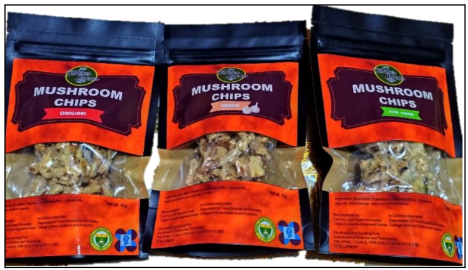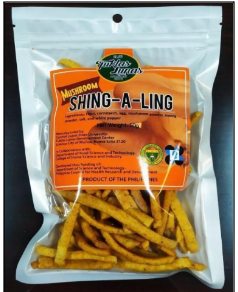HeaRTNovation
Mushroom-based Functional Foods
TECHNOLOGY GENERATOR
Central Luzon State University (CLSU)
Project Leader: Dr. Renato G. Reyes
THE PROBLEM
Mushrooms are widely recognized for their rich nutritional content and medicinal properties. However, there is a notable scarcity of developed food products that leverage mushrooms as a functional ingredient. Although the mushroom growers and processors trained by the Center for Tropical Mushroom Research and Development (CTMRD) at the Central Luzon State University (CLSU) have ventured into mushroom cultivation and diversified their products by processing their harvest into various mushroom-based products such as tempura, noodles, burgers, and more, a notable challenge arises as these mushroom growers and processors lean towards the aspects of production and less on the scientific approach. The lack of a scientific foundation for their activities has also led to the production of mushroom-based products with compromised quality as these are typically marketed mostly for their culinary attributes instead of functionality.


THE SOLUTION
Through funding support from the Department of Science and Technology and monitoring support from the Philippine Council for Health Research and Development, the proponents developed functional food products utilizing the edible mushrooms collected and cultivated by the Mushroom Center from the wild. Nutritional profiling highlighted that these mushrooms are low in fat, rich in dietary fiber, copper, and manganese, and glutamic acid, with substantial amounts of essential and non-essential amino acids. Results of laboratory analyses also show that the mushroom species have potential anti-hypertensive, anti-diabetic, and antioxidant properties. The sensory attributes and microbial safety of these developed products were also evaluated.
The research also delved into the potential incorporation of these mushrooms into crafting functional and nutritious food items, such as mushroom chips, mushroom shing-a-ling, furikake flakes, furikake paste, instant mushroom tea, ready-to-drink mushroom-infused soy coffee, and spray-dried mushroom extract powder. Market acceptability studies were conducted specifically on mushroom chips and shing-a-ling, which are commonly found products locally.
TECHNOLOGY DEVELOPMENT STATUS
The technology is currently at Technology Readiness Level (TRL) 4. Utility model applications are already filed for the mushroom-based products.
CURRENT NEEDS
The technology owners are actively pursuing funding opportunities for the continuous development of the mushroom-based products. They are also open for potential adopters and interested partners to collaborate once the products reach the stage of commercialization. Interested parties may send letters of intent to contact details provided below.
CONTACT DETAILS
Central Luzon State University-Agriculture and Food Technology Business Incubator (CLSU- AFTBI)
Science City of Muñoz, Nueva Ecija
clsuaftbi@clsu.edu.ph




